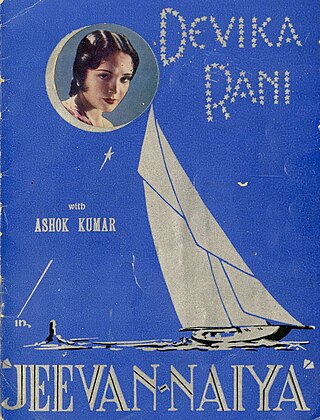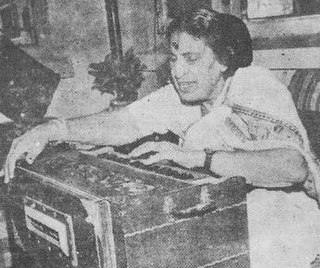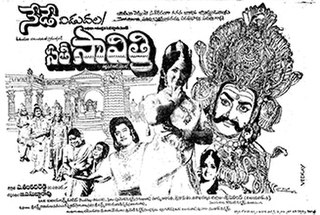
Devika Rani Chaudhuri, usually known as Devika Rani, was an Indian actress who was active in Hindi films during the 1930s and 1940s. She was the first recipient of the Dadasaheb Phalke Award, and was also awarded the Padma Shri. Widely acknowledged as the First Lady of Indian Cinema, Devika Rani had a successful film career that spanned 10 years.

Savitri and Satyavan are a legendary couple in Hinduism. Savitri is a princess who marries an exiled prince named Satyavan, who is prophesied to die early. She saves her husband from the god of death, Yama, persuading the deity to restore his life.

Achhut Kannya is a 1936 Indian Hindi film. The film deals with the social position of Dalit girls and is considered a reformist period-piece.

Jeevan Naiya is a 1936 Indian Hindi film directed by Franz Osten, and produced by Himanshu Rai for his studio Bombay Talkies. It is famous for being the screen debut of early superstar Ashok Kumar. The film is about the ostracism of dancing girls. The film was one of several successful Bombay Talkies collaborations between Franz Osten, Himashu Rai, screenwriters J. S. Kashyap and Niranjan Pal, and their leading lady of the time, Devika Rani.

Saraswati Devi, born Khorshed Minocher-Homji, was an Indian director of music and score composer who worked in Hindi cinema in the 1930s and 1940s. She is most noted for her score, Mein Ban ki Chiriyra Banke Bun Bun Bolun Re in Bombay Talkies's Achut Kanya (1936). She along with Nargis' mother & Sanjay Dutt's grandmother Jaddanbai is considered to be one of the first female music composers in Indian cinema.

Sneh Bandhan also called Intezar, is a social melodrama Bollywood film. It was released in 1940. The film was a maiden production from producer Kikubhai Desai's new banner; Great India Pictures. Previously known to produce crime thrillers and fantasy, this was Desai's first social genre film. The music was by Pannalal Ghosh, with lyrics written by Pandit Betaab. The cast included Bibbo, E. Billimoria, Navin Yagnik, Pratima Devi and Muzammil.

Anjaan is a 1940 Indian Hindi-language film directed by Amiya Chakrabarty and produced by Bombay Talkies. It was Chakrabarty's first film direction. The film's story and screenplay were by Amiya Chakrabarty, with dialogues by J. S. Casshyap. The cinematography was by the debutant R. D. Mathur. Its music direction was by Pannalal Ghosh, with lyrics by Kavi Pradeep and P. L. Santoshi. The film starred Devika Rani, who had recently returned to films after a two-year absence, following the death of her husband Himanshu Rai in 1940. The cast included Ashok Kumar, David, V. H. Desai, Gulab, Suresh and Om Prakash.

Sati Savitri is a 1978 Telugu-language Hindu mythological film directed by B. A. Subba Rao. It stars N. T. Rama Rao, Krishnam Raju, Vanisri and music composed by Ghantasala & Pendyala Nageswara Rao. It is produced by A. Sankar Reddy under the Lalitha Siva Jyothi Studios. The film is based on the story of Savitri and Satyavan.

Janmabhoomi is a 1936 Indian Hindi-language film directed by Franz Osten and starring Devika Rani and Ashok Kumar in the lead roles. Music of the film was by Saraswati Devi, who had worked extensively with Bombay Talkies.

Prem Kahani is a 1937 Indian Hindi film, by Franz Osten and starring Ashok Kumar, N.M. Joshi, Mayadevi, Vimala Devi, Madhurika Devi and others.

Veer Kunal also called Son Of Ashoka is a 1945 Hindi historical fiction film directed by Kishore Sahu. Besides directing the film Sahu also produced it and wrote the story and screenplay. The cinematographer was Chandu. Produced under the Ramnik Productions banner, it had music by Khan Mastana. The starcast consisted of Kishore Sahu, Shobhna Samarth, Durga Khote, Mubarak and Maya Banerji.
Chandragupta is a 1934 Hindi/Urdu historical film directed by A. R. Kardar. Produced by East India Film Company, the music direction was by K. C. Dey. Kardar had shifted to Calcutta where he joined the East India Film Company, and directed "hits" like Chandragupta. The film starred Nazir as Chandragupta. The cast included Gul Hamid, Sabita Devi, Mazhar Khan, Dhiraj Bhattacharya, Vasantrao Pehalwan.

Thokar also called The Kick is a 1939 Indian Hindi-Urdu film directed by A. R. Kardar. Produced by Chandulal Shah for his production banner Ranjit Movietone, it has music by Gyan Dutt. The story writer was M. Sadiq, with cinematography by Gordhanbhi Patel. The cast included Kumar, Ishwarlal, Madhuri, Yakub, Noor Mohammed Charlie, Ram Marathe, Waheedan Bai and Dixit. The story involves a blind villager winning a lottery but he eventually realises that money can not bring happiness.

Jeevan Prabhat is a 1937 Hindi film social drama, produced by Bombay Talkies and directed by Franz Osten. The music director was Saraswati Devi with lyrics and dialogues by J. S. Casshyap. The screenplay was by Niranjan Pal. The film's "star value" was Devika Rani, with Kishore Sahu making his debut as an actor in the film. The cast included another debutant, Renuka Devi, with Mumtaz Ali, Maya Devi and M. Nazir.
![<i>Izzat</i> (1937 film) 1937 [[British India]] film](https://upload.wikimedia.org/wikipedia/commons/thumb/9/9c/Izzat_%281937%29.jpg/320px-Izzat_%281937%29.jpg)
Izzat (transl. Honour) is a 1937 Hindi film social drama, directed by Franz Osten. The film was produced by Himanshu Rai for Bombay Talkies. The credit roll of Izzat attributes the story to Dr. G. Nundy, adapted for screen by J. Nundy. The screenplay was by Niranjan Pal, who handled the story section of Bombay Talkies. J. S. Casshyap wrote the songs and dialogues and was assisted in dialogue direction by S. I. Hassan. The music was composed by Saraswati Devi, with actor Mumtaz Ali doubling as the choreographer. The film starred Ashok Kumar with Devika Rani in the lead, while the rest of the cast included Mumtaz Ali, Madhurika, Kamtaprasad, Chandraprabha, and P. F. Pithawala.
![<i>Bhabhi</i> (1938 film) 1938 [[British India]] film](https://upload.wikimedia.org/wikipedia/commons/thumb/5/5f/Bhabhi_1938.jpg/320px-Bhabhi_1938.jpg)
Bhabhi (Sister-in-Law) is a 1938 social family drama Hindi film directed by Franz Osten. The film was based on a Bengali novel written by Sharadindu Bandyopadhyay called "Bisher Dhoan". Bandyopadhyay was a famous Bengali novelist and short story writer also known as the creator of the fictional detective Byomkesh Bakshi. The cinematographers were Wirsching and Pareenja. Dialogues and lyrics by J. S. Casshyap. V. H. Desai, the comedian, got his "big break" in Bhabhi when he joined Bombay Talkies. He became popular as the nervous father of the heroine Renuka Devi. S. N. Tripathi started his acting with a small role in the film. The film had the new found Renuka Devi in the lead.
![<i>Vachan</i> (1938 film) 1938 [[British India]] film](https://upload.wikimedia.org/wikipedia/commons/thumb/6/62/Vachan_1938_films.jpg/320px-Vachan_1938_films.jpg)
Vachan is a 1938 costume drama Hindi film directed by Franz Osten. The regular Bombay Talkies writer, Niranjan Pal, walked out of the Bombay Talkies production team after an altercation with Himanshu Rai in 1936. Saradindu Bandyopadhyay, a famous writer known also for creating Byomkesh Bakshi, replaced Pal in the story department, writing for films like Nirmala and Vachan in 1938 and Durga in 1939. The screenplay was by Agha Jani Kashmiri, with dialogues and lyrics by J. S. Kashyap. The music was composed by Saraswati Devi aided by J. S. Kashyap. The film starred Devika Rani and Ashok Kumar, a popular pair from Bombay Talkies who worked in seven films together. Devika Rani remained the bigger star with Kumar's name being "over-shadowed" in the credit rolls, as well as the publicity of the film.

Nirmala is a 1938 Indian Hindi-language social drama film directed by Franz Osten and produced by Bombay Talkies.














![<i>Izzat</i> (1937 film) 1937 [[British India]] film](https://upload.wikimedia.org/wikipedia/commons/thumb/9/9c/Izzat_%281937%29.jpg/320px-Izzat_%281937%29.jpg)
![<i>Bhabhi</i> (1938 film) 1938 [[British India]] film](https://upload.wikimedia.org/wikipedia/commons/thumb/5/5f/Bhabhi_1938.jpg/320px-Bhabhi_1938.jpg)
![<i>Vachan</i> (1938 film) 1938 [[British India]] film](https://upload.wikimedia.org/wikipedia/commons/thumb/6/62/Vachan_1938_films.jpg/320px-Vachan_1938_films.jpg)
